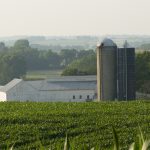As spring wild bird migration nears, Pennsylvania Department of Agriculture Secretary Russell Redding and Pennsylvania Emergency Management Agency (PEMA) Director Randy Padfield remind poultry owners to protect their flocks, and their neighbors’ flocks, along with the commonwealth’s economy, against highly pathogenic avian influenza (HPAI) by remaining vigilant and reviewing and implementing strong biosecurity plans and practices.
The United States Department of Agriculture’s (USDA) Animal Health and Plant Inspection Service recently confirmed HPAI in commercial flocks in Virginia.
“The best line of offense is a strong defense. Biosecurity is the best way to ensure your farm and poultry are safeguarded against disease,” said Redding. “Poultry producers should review and use strong biosecurity practices as part of their daily routine to protect their flocks, as well as Pennsylvania’s $7.1 billion poultry industry.”
With the continued threat of HPAI, there are strategic measures both commercial producers and backyard flock owners can take to protect their birds and operations:
- Strengthen your biosecurity plan. Biosecurity is most important for anyone who owns or works with poultry – whether on a commercial farm, in the wild, or a backyard flock. Pennsylvanians should take proper steps to keep HPAI from spreading:
- Keep visitors to a minimum. Only allow those people who take care of your poultry to come in contact with your birds; this includes family and friends. Keep track of everyone who is on your property at all times. Make sure everyone who has contact with your flock follows your biosecurity principles.
- Wash your hands before and after contact with live poultry. In addition to potentially spreading disease from farm to farm or bird to bird, you can also spread germs such as Salmonella that can impact human health. Wash with soap and water (always your first choice). If using a hand sanitizer, first remove manure, feathers, and other materials from your hands because disinfectants and sanitizers will not penetrate organic matter or caked-on dirt.
- Provide disposable boot covers or clean boots for anyone having contact with your flock. A footbath can be added as extra protection. If using a footbath, be sure to remove all droppings, mud, or debris from boots and shoes using a long-handled scrub brush before stepping into the disinfectant footbath, and always keep it clean.
- Change clothes before entering poultry areas and before exiting the property. Visitors should wear protective outer garments or disposable coveralls, boots, and headgear when handling birds, and remove outer clothing or change clothes when leaving the facility.
- Clean and disinfect tools or equipment before moving them to a new poultry facility. Before allowing service vehicles, trucks, tractors, or tools and equipment—including egg flats and cases that have come in contact with birds or their droppings—to exit the property, make sure they are cleaned and disinfected to prevent contaminated equipment from transporting disease. Do not move or reuse items that cannot be cleaned and disinfected, such as cardboard egg flats.
- Report sick birds. Don’t wait. If your birds are sick or dying, call a local veterinarian, cooperative extensive service, or state veterinarian. If you suspect HPAI, contact the PA Department of Agriculture 24/7 at 717-772-2852, option 1.
- Have a premises ID. The ability to identify where poultry flocks are located in a disease outbreak is important to help animal health officials stop the spread of disease quickly. Using Premises ID, state officials can quickly notify all flock owners of a dangerous disease in their area, provide recommendations for reducing the risk of their flocks becoming infected, and recommend testing if needed to rule out disease.
- Keep poultry away from areas frequented by wildfowl. Keep your birds indoors at high-risk times. If they cannot go indoors, make sure wild birds cannot access their feed and water sources.
- Maintain sanitation of property, poultry houses, equipment, vehicles, and footwear. Disinfect regularly and maintain biosecure, restricted access to your facility. For commercial poultry owners, clean and disinfect housing at the end of a production cycle.
- Be aware of the signs and symptoms of HPAI in your flock:
- Sudden death without clinical signs
- Lack of energy and appetite
- Decreased egg production or soft-shelled or misshapen eggs
- Swelling of head, comb, eyelid, wattles, and hocks
- Purple discoloration of wattles, comb, and legs
- Nasal discharge, coughing, and sneezing
- Incoordination
- Diarrhea
The Pennsylvania Department of Agriculture continues to work with federal, state, local, and industry partners to prevent, prepare for, respond to, and recover from animal diseases, including HPAI. These partnerships, including those with PEMA and USDA, support a resilient commonwealth and foster continued economic opportunity.
PEMA coordinates resources and support across all levels of government and understands how critical it is to the poultry industry to ensure a rapid and efficient response to a HPAI outbreak.
“This influenza presents unique challenges that, if not managed through a robust and coordinated approach, could devastate an industry that is an economic driver in Pennsylvania,” said Padfield. “Our role in resource coordination and support brings together experts in many areas to assist the Pennsylvania Department of Agriculture to accomplish that goal.”
HPAI has directly impacted 25 commercial flocks and 10 backyard flocks in Pennsylvania, causing a loss of more than 4.3 million birds. On April 15, 2022, the department confirmed the state’s first positive case of HPAI in domestic poultry, in a flock of commercial layer chickens on a Lancaster County poultry farm. The most recent positive case detected in the commonwealth was on November 17, 2022. However, the department’s Bureau of Animal Health and Diagnostic Services continues to provide testing for suspected cases.
Producers can receive some federal funding to cover their losses due to HPAI, but Pennsylvania is the only state to have a dedicated fund of $25 million to help fill the gap in covering losses.
Pennsylvania’s poultry sector is a $7.1 billion industry, supporting more than 26,600 jobs across the commonwealth.
HPAI is very contagious and can make wild and domesticated birds very sick and lead to death. According to the U.S. Centers for Disease Control and Prevention, HPAI detections do not present an immediate public health concern. No human cases of these avian influenza viruses have been detected in the U.S.
If you suspect your poultry is infected with HPAI, please report your concerns 24 hours a day, 7 days a week to the department’s Bureau of Animal Health and Diagnostic Services at 717-772-2852, option 1.
For more information about avian influenza, visit agriculture.pa.gov or the USDA website.




